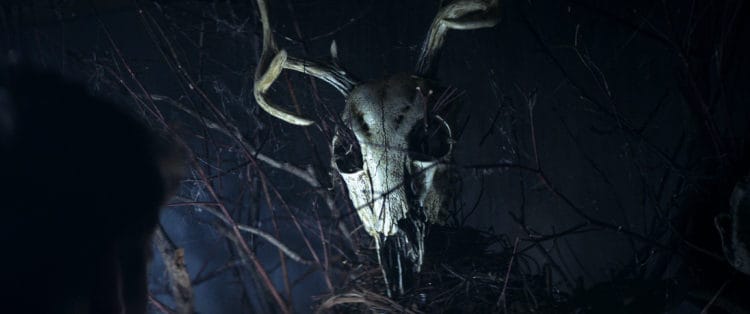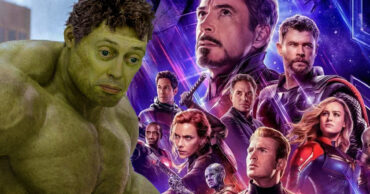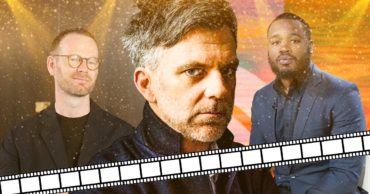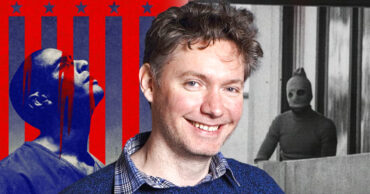
IFC Midnight’s horror film, THE WRETCHED is continuing to make headlines as it has been number one on box office charts for the past few weeks. A big reason for this, drive-in theaters. The film was always going to have a limited theatrical run, but when the pandemic hit and most major theater chains closed, IFC decided to try something different, embracing drive-in theaters across the U.S. Their experiment paid off, as the indie has currently grossed over $600,000 from drive-ins alone. Twenty-one locations to an expanded fifty-nine to be exact. With audiences and critics buzzing about the horror tale, we decided to speak with the film’s composer, Devin Burrows and find out how he created the film’s memorable score. THE WRETCHED is also currently available on VOD.
-THE WRETCHED can be classified as witch lore. Musically, how is this subgenre different than a traditional horror slasher film?
I imagine that the HALLOWEEN theme is one of the most recognizable in film music, and the music in that film is an integral part of that movie’s jump-scares. THE WRETCHED is thematic, so it’s similar HALLOWEEN in that way; THE WRETCHED score owes more to yesteryear films, like Bernard Herrmann’s music for PSYCHO. THE WRETCHED is also quite varied in tone. The film has playful and sentimental moments, so I aimed to write music that enchanted horror audiences as well as something distinctive that ran the gamut of emotions in the story. I really shoot to give every film a unique sound; for the witch and woods, we employed sarangi and bowed psaltery.
-In a previous interview you said, “It’s amazing how music can influence the meaning of a scene.” What scene in THE WRETCHED do you think was most influenced by your score?
Music can change the meaning of a scene in every sense! If the music is comedic rather than tense, it may change how the audience interprets the character’s feelings or demeanor. I often write from the character’s perspective.
We spent a lot of time getting the music for the woods just right; it’s something the Pierce brothers, the directors, and I began collaboration on during the script-writing phase, and I feel it helps set the tone for the grim woods where the witch’s magic is active.
-You wove several themes into THE WRETCHED. Can you talk about a few of those?
Yes! The Pierces and I are passionate about film music that has themes that pull the audience in emotionally and escalate throughout a film. I love scores like E.T., ALIEN, and POLTERGEIST. THE WRETCHED’s central theme is about the witch’s curse; it is used in many different emotional contexts. It can feel creepy, tenderhearted, mysterious, or action-packed depending on how it is harmonized and performed. Writing that theme was one of the fantastic challenges of THE WRETCHED, and also the most gratifying.
There is another theme when there is conflict with the witch. It’s quite deliberate and menacing in tone. You’ll know it when you hear it! The sonic tapestry of the movie has several themes and motifs woven in.
-You have worked with the directors, The Pierce Brothers, before on DEADHEADS. What would you say is their biggest strength as filmmakers
Brett and Drew are truly good at communicating their vision and giving people enough room to work their expertise. They always challenge me; I think they know how to get the best out of their team. It’s super fun to collaborate with them!
– You mentioned there were many genre nods in THE WRETCHED, such as JAWS. What track or part of the film can people hear this at?
Very early during the production, the Pierces made it clear that the film was going to have a lot of character development and that it would vary in tone, akin to films like JAWS. So JAWS influenced the approach to narrative music-writing, more than anything else. There is one musical cue titled “The Road to Amity Marina,” because there are some scenes in THE WRETCHED that are nods to JAWS, to be sure. With all it’s genre references, we hope that THE WRETCHED, the film and the score, contribute something new to the genre film tradition.
-You say that poetry inspires you, is there a specific poem that helped inspire you score for THE WRETCHED?
I surround myself with all kinds of art that affects me. I have prints by Martin Lewis, poetry by Langston Hughes, and musical scores from all eras. Inspiration can spring from just about anywhere! I can’t say that there is a specific poem that spurred the music for THE WRETCHED. A lot of music did though! I studied several musical pieces about witches and witchcraft, including Mussorgsky’s “The Hut on Hen’s Legs” and De Falla’s “El Amor Brujo.”
-What would be your dream project to score?
Wow! How about an orchestral score for a remake of THE RED SHOES? That movie is a masterpiece. I treasure all kinds of stories, long and short-form, from psychological thrillers to science fiction. I would love to do a short-form series. Something that would allow me to introduce new music throughout a season and have themes for several characters!
-Has anything you read from critics or audiences about the film’s score surprised you?
The response to THE WRETCHED has been overwhelming! Reading the comments about the score, like the one in The Hollywood Reporter, has been incredible! I’m feeling a powerful sense of gratitude.
-Which can you make sound scarier, a violin or piano?
Wow! It all depends on the context! I feel that any instrument can be made to sound scary. Combinations of instruments, trombones, and tam-tam, for instance, can produce chilling results. Experimentation is vital to imbue what is on-screen with an exclusive character. Lately, I’ve been experimenting with a bass bow and various objects. You’d be amazed at the sounds you can get from bowed glass!
 Follow Us
Follow Us




